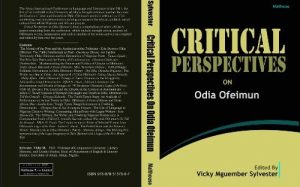From Port Harcourt comes Ekaete George, author of the poetry collection titled Saints and Scoundrels, with this piece on Odia Ofeimun who has been in this news for clocking 70 this week

The writer
By Ekaete George
The year 2001 was when I first encountered Odia Ofeimun outside of the pages of study materials for my Nigerian Literature course in the University of Calabar. I cannot remember whether I had heard his name mentioned as at the time his personality struck me. Here was a distinguished writer who had opinions and most notably was never afraid to voice them even if many, many times. For a second-year student of literature who attended the convention as a personal exploration of my interest in becoming a writer, and in discovering the human aspects of the Nigerian literati, Odia Ofeimun became someone whose opinions intrigued me. Now, many years later, after several conversations with him about the circumstances that led to his pivotal role at the Presidential Hotel venue of 2001 Convention of the Association of Nigerian Authors which held in Port Harcourt, Rivers State; and even more insights into his thoughts, motivations and principles, I remain awed by this icon.
So it was with some curious trepidation that while in a bus ride to sight-seeing in Asaba 2002 Convention of ANA I showed to him a poem titled “Bridges”, that I had written about the experience of crossing the River Niger bridge for the first time. I looked at him, the way a child looks at someone who they believe in, while he read the poem and took in my baby steps at writing as if it was something that mattered to him. When he looked up and told me that what I did was good, the validation became the springboard for my confidence as a writer. But very unlike my confidence which ebbs and tides through the years, Odia Ofeimun has remained constant in mentoring and reminding me that our work, as writers, matters.
Let me share my list of 7 Things @ 70 About Odia Ofeimun That Matter
No. 1: Most tellingly for me has been his integrity as a mentor. Over the years, he has made personal sacrifices of time and other valuable resources to encourage up and coming and even established writers to better their craft. He does this without asking for anything in return. In spite of how powerful he has remained in literary circles, he has treated women with the utmost respect and consideration. A remarkable choice being in a society where predatory and harassing behavior is oftentimes condoned.
No. 2: He is patient. This may sound confusing to people who have ever had the good fortune of being on an opposing side of an argument with Odia Ofeimun. However, many whom I have spoken to about him agree that while he defends his positions passionately and relentlessly, he is tolerant of other viewpoints. He believes in justice and accountability and is willing to wait for it to happen no matter how long, and to write about it while waiting.
 No. 3: He LOVES books. Much has been said about his love for books and writing. When I first visited his home in Ikeja, I was stunned by the sheer number of books and the ease at which the books lay all over the place. Over time, I have learned that in spite of his greatness he sources for, buys and reads almost every new book of literature.
No. 3: He LOVES books. Much has been said about his love for books and writing. When I first visited his home in Ikeja, I was stunned by the sheer number of books and the ease at which the books lay all over the place. Over time, I have learned that in spite of his greatness he sources for, buys and reads almost every new book of literature.
No. 4: He is warm and hospitable. If you were to visit Odia Ofeimun at home (especially when you did not interrupt his writing by coming uninvited) you would get the sense that you are very welcome. If you were to come from out of town, it would feel like you could stay there through the duration of your visit. He makes easy conversation, serves good food and gifts books. He is just the best host!
No. 5: He is passionate about good governance. I personally love to listen to Odia Ofeimun talk possibly because I gravitate towards people who explore the pragmatic, intellectual and philosophical side of even the most mundane things. Still, apart from literature, the other subject that he has the most profound thoughts on is governance. His vision of a leadership that serves the interests of the led, either of the writers’ association ANA or of Nigeria, is unwavering.
No. 6: He is a loyal friend. I have read many pieces from Odia Ofeimun’s contemporaries and friends enough to confirm the impression I have of him cannot be wrong. He is fiercely loyal. When at a writers’ gathering in Yenagoa he decided to visit me in my hotel room, my friends and colleagues who were with me were stunned. No, it was not a powerful man visiting a woman! It was that of a considerate friend who insisted that it was safer and easier for him to visit than it was for me to visit him. When you are lucky to have Odia in your corner, he so easily makes you at ease with his immense importance.
No. 7: He is (brutally) honest. One thing that stands out for me, about my inspiration Odia Ofeimun, is that even if you don’t like him, you always know where he stands. There is no speaking from both sides of his mouth for any kind of expediency. He is honest in a way that can unnerve the dubious but will refresh the authentic. He is transparent in the sense that you can either love him or leave him, but you will never be confused while at it.
This year, Odia Ofeimun’s friends and admirers have come together to celebrate, on his milestone 70th birthday, his legacy and its tremendous significance in the Nigerian literary and socio-political landscape. I hereby send hearty felicitations to him: Sir, I wish that you savor this incredibly important milestone in your life and the goodwill that you have so deservedly earned. I also wish you many more productive, healthy and fun-filled years. I wish you live long enough to see a Nigeria that takes itself seriously enough to deserve a citizenry that takes it seriously. As you would say to me about Nigeria, “If we try some more, we shall arrive’, I promise we will stand by you trying, organizing and writing what matters.




























